It was on the night of Nov. 9-10, 1938, when members of the Nazi party sponsored anti-Jewish riots (pogroms) which attacked Jewish persons and destroyed Jewish owned property in Germany and Austria. “Kristallnacht, the Night of Broken Glass” is regarded by historians as “the Night the Holocaust began” in Europe, which ultimately led to the murder of more than six million Jews.
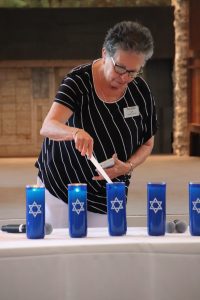 To remember those events, the Catholic-Jewish Dialogue of Collier County hosted its annual “Kristallnacht: The Night of Broken Glass” Nov. 5, 2022, at Temple Shalom in Naples. The event was co-sponsored by the Diocese of Venice and Jewish Federation of Greater Naples, GenShoah of SWFL, and the Holocaust Museum and Janet G. and Harvey D. Cohen Education Center.
To remember those events, the Catholic-Jewish Dialogue of Collier County hosted its annual “Kristallnacht: The Night of Broken Glass” Nov. 5, 2022, at Temple Shalom in Naples. The event was co-sponsored by the Diocese of Venice and Jewish Federation of Greater Naples, GenShoah of SWFL, and the Holocaust Museum and Janet G. and Harvey D. Cohen Education Center.
On behalf of the Diocese, Bishop Frank J. Dewane said it is necessary to come together to remember Kristallnacht and the Holocaust which followed. But this year’s gathering was held in the context of a recent spate of anti-Semitic incidents including the placing of lawn signs in communities throughout Naples, Collier County and the entire Diocese of Venice.
“Unfortunately, we need to acknowledge this inhumane unchristian rebirth that we have evidenced in Southwest Florida – of anti-Semitism,” Bishop Dewane said.
The Bishop said Catholic and Jewish peoples have a common parentage which bond the two together. The coming together through the Dialogue allows for open discussion which ultimately prevents misunderstandings and mistrust, fostering a way for the two faiths to see each other with a deep amount of respect.
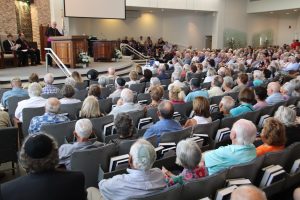 “Each one of us has a responsibility to take action when we see anti-Semitism,” Bishop Dewane continued. “It isn’t just for the Dialogue group to resolve. It isn’t just for a Parish or synagogue. It’s for all of us to come together when we see the negativity that can rears its head, just as it did so many years ago when Kristallnacht foreshadowed what the world never thought could happen (the Holocaust) – and it did happen. You and I have responsibilities to speak out and to speak up.”
“Each one of us has a responsibility to take action when we see anti-Semitism,” Bishop Dewane continued. “It isn’t just for the Dialogue group to resolve. It isn’t just for a Parish or synagogue. It’s for all of us to come together when we see the negativity that can rears its head, just as it did so many years ago when Kristallnacht foreshadowed what the world never thought could happen (the Holocaust) – and it did happen. You and I have responsibilities to speak out and to speak up.”
The guest speaker was Dr. Suzanne Brown-Fleming, Director of the International Academics Programs Mandel Center for Advanced Holocaust Studies at the U.S. Holocaust Memorial Museum and her topic was “November 1938: Perspective from the Vatican Archives.”
In her talk, focused on the month following Kristallnacht, Brown-Fleming said a certain context was needed, reminding the audience that the groundbreaking 1965 Vatican II document Nostra Aetate (In Our Time), which redefined the relationship between the Church and other non-Christian faiths, was years away. Nostra Aetate importantly states that what happened in the Passion of Christ “cannot be charged against the Jews then alive, nor against the Jews today.”
Brown-Fleming cited several diplomatic and personal reports sent to and from the Vatican regarding Kristallnacht as well as correspondence from the faithful, who were almost all blatantly anti-Semitic, blaming the Jewish people for the death of Christ, and because of this, saw little reason to help the Jews in Germany or elsewhere.
In the end, Brown-Fleming said the Vatican was “not willing to aggressively condemn the Nazi action against the Jews, but only to authorize on behalf of the Pope a reminder of the Church of the mission to aid the suffering and the persecuted. It is quite an understatement to say this response in these troubling times was not enough.” She noted much has changed since Nostra Aetate.
A poignant moment during the annual commemoration was a candle lighting ceremony. Six candles were lit by Gen Shoah (second generation Holocaust survivors). Each lit their candle for the victims of the Holocaust and for a brighter future.
Among the dignitaries present for the commemoration were, Michael A. Feldman, co-founder of the Holocaust Museum of Southwest Florida; Rabbi Adam Miller, Temple Shalom; Jane Schiff, Board Chair of the Jewish Federation of Greater Naples; Marty Gauthier, Dialogue Catholic co-chair; Luba Rotsztain, Dialogue Jewish co-chair; Rabbi Mark Gross, Jewish Congregation of Marco Island; Rabbi Ammos Chorny, Beth Tikvah; Father Robert Kantor, Pastor of St. Agnes Parish in Naples; and Yvonne Holtzman, Candle Lighting Chair, Dialogue member and Gen Shoah. Also present were more than two dozen youth who are in the Confirmation program at St. Agnes Parish.
The Catholic-Jewish Dialogue of Collier County has been working together for 21 years with the purpose of engaging Catholics and Jews in understanding our past history and advancing the cause of mutual understanding and appreciation of our differences, as well as our commonalities.






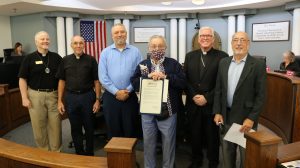 The City Council approved a proposed proclamation condemning a June 25 incident during which anti-Semitic flyers were distributed to lawns and driveways of residential homes in the City of Venice. Shortly after the that disturbing event, Venice Mayor Ron Feinsod received an e-mail in the form of anti-Semitism hate mail.
The City Council approved a proposed proclamation condemning a June 25 incident during which anti-Semitic flyers were distributed to lawns and driveways of residential homes in the City of Venice. Shortly after the that disturbing event, Venice Mayor Ron Feinsod received an e-mail in the form of anti-Semitism hate mail.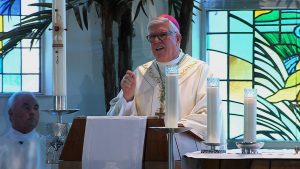
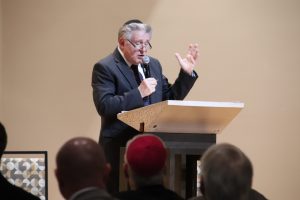 Rabbi Abraham Skorka and Pope Francis have served as examples of friendship and interreligious dialogue because they have lived out the call of Nostrae Aetate which acknowledges the Church’s bond with the Jewish people.
Rabbi Abraham Skorka and Pope Francis have served as examples of friendship and interreligious dialogue because they have lived out the call of Nostrae Aetate which acknowledges the Church’s bond with the Jewish people.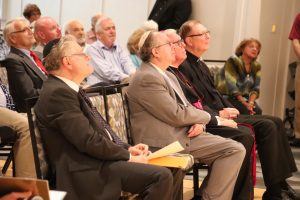 Bishop Frank J. Dewane also addressed the Catholic-Jewish Dialogue gathering, talking about the noble mission of the group.
Bishop Frank J. Dewane also addressed the Catholic-Jewish Dialogue gathering, talking about the noble mission of the group.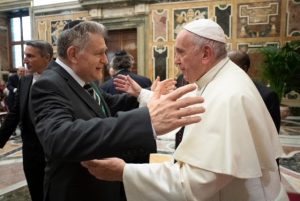 All are invited to attend the program which is co-sponsored by the Diocese of Venice and Jewish Federation of Greater Naples. The presentation will take place at 3 p.m. Sunday, April 3, 2022, in the ballroom of St. John the Evangelist Parish, 625 111th Ave. N., Naples. Doors open at 2:30 p.m.
All are invited to attend the program which is co-sponsored by the Diocese of Venice and Jewish Federation of Greater Naples. The presentation will take place at 3 p.m. Sunday, April 3, 2022, in the ballroom of St. John the Evangelist Parish, 625 111th Ave. N., Naples. Doors open at 2:30 p.m.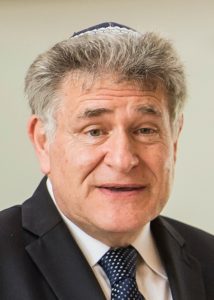 “His message to my synagogue in 2004 went on to develop the idea of the encounter between the individual and God, and of the importance of memory in that relationship. He alluded to the essence of Jewish belief expressed during this most holy season, the Days of Awe: to believe in the Creator who relates to each person and remembers each individual. In fact, I was astonished to hear this sermon. (His) message on this occasion could well have been the reflections of a Rabbi to his community.”
“His message to my synagogue in 2004 went on to develop the idea of the encounter between the individual and God, and of the importance of memory in that relationship. He alluded to the essence of Jewish belief expressed during this most holy season, the Days of Awe: to believe in the Creator who relates to each person and remembers each individual. In fact, I was astonished to hear this sermon. (His) message on this occasion could well have been the reflections of a Rabbi to his community.”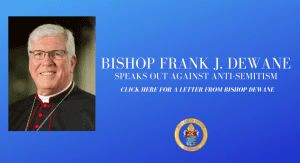 I ask the Faithful of the Diocese of Venice to join me in condemning these despicable acts. Hate is never to be tolerated. Pope Francis said anti-Semitism is “a fuse that must not be allowed to burn. And the best way to defuse it is to work together, positively, and to promote fraternity.” Let us be united in prayer.
I ask the Faithful of the Diocese of Venice to join me in condemning these despicable acts. Hate is never to be tolerated. Pope Francis said anti-Semitism is “a fuse that must not be allowed to burn. And the best way to defuse it is to work together, positively, and to promote fraternity.” Let us be united in prayer.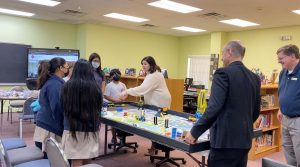 The St. Catherine Catholic School Robotics Team demonstrated their skills on Feb. 15, 2022, in Sebring during a visit from Diocese of Venice Superintendent of Catholic Education Father John Belmonte, SJ, and Jennifer Falestiny, Diocesan Curriculum Specialist. The team has made remarkable progress in their skill level and has participated in a few competitions to hone their skills in preparation for a Diocesan Robotics Competition in May.
The St. Catherine Catholic School Robotics Team demonstrated their skills on Feb. 15, 2022, in Sebring during a visit from Diocese of Venice Superintendent of Catholic Education Father John Belmonte, SJ, and Jennifer Falestiny, Diocesan Curriculum Specialist. The team has made remarkable progress in their skill level and has participated in a few competitions to hone their skills in preparation for a Diocesan Robotics Competition in May.
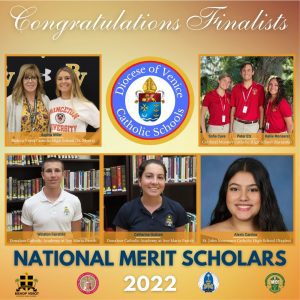 Congratulations to the seven Diocese of Venice Catholic high school seniors for advancing as Finalists in the National Merit Scholarship Program! The finalists are: Alexis Camina of St. John Neumann Catholic High School in Naples; Catherine Graham and Winston Fairchild of Donahue Catholic Academy of Ave Maria Parish; Hallie Monserez, Peter Etz and Sofia Cava of Cardinal Mooney Catholic High School in Sarasota; and Sophia Miller of Bishop Verot Catholic High School in Fort Myers. Finalists have an opportunity to continue in the competition for some 7,500 National Merit Scholarships worth more than $30 million. The process to become a Finalist includes submitting a detailed application with information about their academic record, participation in school and community activities, demonstrated leadership abilities, employment, as well as honors and awards received.
Congratulations to the seven Diocese of Venice Catholic high school seniors for advancing as Finalists in the National Merit Scholarship Program! The finalists are: Alexis Camina of St. John Neumann Catholic High School in Naples; Catherine Graham and Winston Fairchild of Donahue Catholic Academy of Ave Maria Parish; Hallie Monserez, Peter Etz and Sofia Cava of Cardinal Mooney Catholic High School in Sarasota; and Sophia Miller of Bishop Verot Catholic High School in Fort Myers. Finalists have an opportunity to continue in the competition for some 7,500 National Merit Scholarships worth more than $30 million. The process to become a Finalist includes submitting a detailed application with information about their academic record, participation in school and community activities, demonstrated leadership abilities, employment, as well as honors and awards received.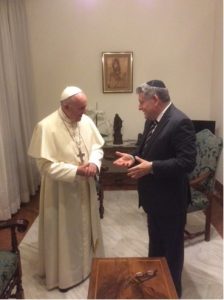 The Catholic-Jewish Dialogue of Collier County presents Rabbi Abraham Skorka, a longtime friend of Pope Francis, for a presentation at 3 p.m., Sunday, April 3, at St. John the Evangelist Parish, 625 111th Ave. N., Naples. With his return visit to the Diocese of Venice, Rabbi Skorka will describe his ongoing Catholic-Jewish dialogue with Pope Francis beginning while the Pontiff was Archbishop of Buenos Aires and which continues to this day. The program is presented by the Catholic-Jewish Dialogue of Collier County, the Diocese of Venice and the Jewish Federation of Greater Naples. Tickets are $18 per person in advance ($25 at the door if space is available). To purchase tickets, please visit
The Catholic-Jewish Dialogue of Collier County presents Rabbi Abraham Skorka, a longtime friend of Pope Francis, for a presentation at 3 p.m., Sunday, April 3, at St. John the Evangelist Parish, 625 111th Ave. N., Naples. With his return visit to the Diocese of Venice, Rabbi Skorka will describe his ongoing Catholic-Jewish dialogue with Pope Francis beginning while the Pontiff was Archbishop of Buenos Aires and which continues to this day. The program is presented by the Catholic-Jewish Dialogue of Collier County, the Diocese of Venice and the Jewish Federation of Greater Naples. Tickets are $18 per person in advance ($25 at the door if space is available). To purchase tickets, please visit 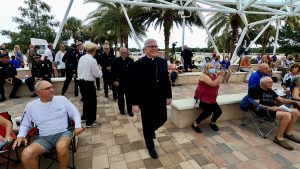 Bishop Dewane, joined by several Diocesan priests and deacons at the ceremony, offered the Invocation, asking Our Lord God of Peace to bring that same peace to a world that is often violent.
Bishop Dewane, joined by several Diocesan priests and deacons at the ceremony, offered the Invocation, asking Our Lord God of Peace to bring that same peace to a world that is often violent.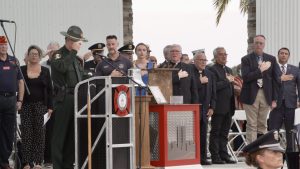 Dozens of community leaders from a wide variety of police and fire departments also addressed the crowd with words of inspiration and hope, as they encouraged all to never forget the nearly 3000 lives lost on that tragic day, including 343 FDNY firefighters who fought valiantly to reach those trapped in the twin towers.
Dozens of community leaders from a wide variety of police and fire departments also addressed the crowd with words of inspiration and hope, as they encouraged all to never forget the nearly 3000 lives lost on that tragic day, including 343 FDNY firefighters who fought valiantly to reach those trapped in the twin towers.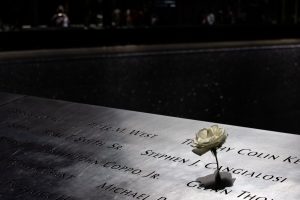 The Commemoration, organized by the Sarasota Ministerial Association, will begin at 6 p.m., Sept. 11, 2021, the anniversary of the 2001 terror attacks on the United States. The memory of those who died will be honored. All first responders, active military, POW/MIA and veterans will also be recognized. There will be a call for all Americans to the “Unity of One Nation Under God.”
The Commemoration, organized by the Sarasota Ministerial Association, will begin at 6 p.m., Sept. 11, 2021, the anniversary of the 2001 terror attacks on the United States. The memory of those who died will be honored. All first responders, active military, POW/MIA and veterans will also be recognized. There will be a call for all Americans to the “Unity of One Nation Under God.”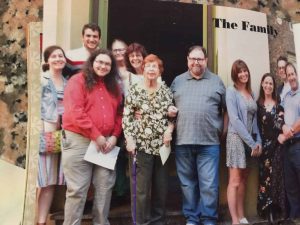
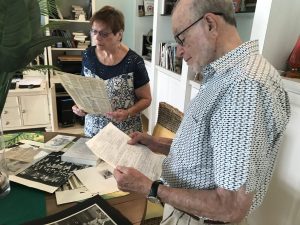 In 1942, halfway around the world in Chicago, then 17-year old Arthur Sheridan was realizing that engineering school was not for him, so he decided to join the U.S. Army. Sheridan, who wanted to fly, would go through basic training at Fort Benning, Georgia, and much to his dismay would score high on an engineering test which led to him attending Indiana University for the U.S. Army Specialized Training Corps.
In 1942, halfway around the world in Chicago, then 17-year old Arthur Sheridan was realizing that engineering school was not for him, so he decided to join the U.S. Army. Sheridan, who wanted to fly, would go through basic training at Fort Benning, Georgia, and much to his dismay would score high on an engineering test which led to him attending Indiana University for the U.S. Army Specialized Training Corps.